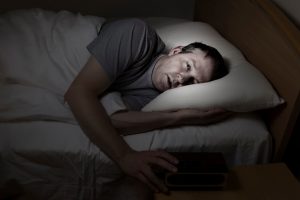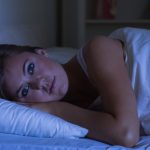 Recent research has found that Parkinson’s disease, Lewy body dementia and REM sleep behavior disorder are all related. When we are asleep our body goes through different sleep phases, the deepest of which is known as rapid eye movement, or REM. During normal REM our body becomes temporarily paralyzed, and this is where we beginning dreaming. People with REM sleep behavior disorder (RBD) do not become paralyzed and instead act out their dreams. This can be quite dangerous, not only for the individual, but for others around them as well.
Recent research has found that Parkinson’s disease, Lewy body dementia and REM sleep behavior disorder are all related. When we are asleep our body goes through different sleep phases, the deepest of which is known as rapid eye movement, or REM. During normal REM our body becomes temporarily paralyzed, and this is where we beginning dreaming. People with REM sleep behavior disorder (RBD) do not become paralyzed and instead act out their dreams. This can be quite dangerous, not only for the individual, but for others around them as well.
Benjamin L. Walter, M.D., director of the Parkinson’s and Movement Disorders Center at University Hospitals Case Medical Center, said to Neurology Advisor, “Normally, during REM sleep, reduced serotonergic activity in the brain leads to atonia or loss of muscle tone through action in a network involving brainstem nuclei including the locus subcoeruleus and magnocellularis nucleus. In RBD, this mechanism is dysfunctional, possibly due to pathology in this circuit, and there is not loss of tone during REM sleep.”
Advertisement
It has been found that RBD and neurological disorders are related. In fact, up to 60 percent of Parkinson’s disease patients suffer from RBD and between 80 to 100 percent of Lewy body dementia patients suffer from the sleep disorder as well.
Dr. Walter added, “What these diseases all have in common is that they are synucleinopathies, and they have pathology that involves specific subcortical and brainstem areas, including those involved in the regulation of atonia during REM sleep.”
REM sleep behavior disorder, an early symptom of Parkinson’s disease
 Research suggests that REM sleep behavior disorder is an early symptom of Parkinson’s disease. The findings suggest that nearly half of those with RBD will go on to develop Parkinson’s disease. The study also added that nearly every person with RBD will go on to develop a neurological disorder.
Research suggests that REM sleep behavior disorder is an early symptom of Parkinson’s disease. The findings suggest that nearly half of those with RBD will go on to develop Parkinson’s disease. The study also added that nearly every person with RBD will go on to develop a neurological disorder.
Co-author of the study, Dr. Michael Howell, said, “If you get this disorder and live long enough, you will almost certainly get Parkinson’s disease or a condition similar to it – it’s an early warning sign.”
The main symptom of RBD is acting out dreams when the person should normally be in a paralyzed state. Researchers believe that individuals with RBD have a brain-stem malfunction, which allows for the movement to take place.
Patients with RBD report that movement can range from small hand gestures to violent acts, such as punching or kicking.
To determine if RBD contributes to Parkinson’s disease the research team went through over 500 studies published between 1986 and 2014. What they found was 81 to 90 percent of RBD patients went on to develop a neurological disorder.
Parkinson’s is caused by the breakdown of certain proteins in neurons that produce dopamine. The protein breakdown is of alpha-synuclein, and RBD is believed to result from the early stages of alpha-synuclein breaking down.
Although there is no cure for RBD, there are treatment methods to control it. Parkinson’s disease also has no cure, but treatments are available to slow down its progression and better control related symptoms.
REM sleep behavior disorder, a predictor of Lewy body dementia
 REM sleep behavior disorder has also been linked to Lewy body dementia, another neurological disorder, as an early predictor of the disease. Lewy body dementia is a form of dementia with the presence of Lewy bodies in the brain.
REM sleep behavior disorder has also been linked to Lewy body dementia, another neurological disorder, as an early predictor of the disease. Lewy body dementia is a form of dementia with the presence of Lewy bodies in the brain.
Researchers investigated 136 patients diagnosed with Lewy body dementia or Parkinson’s disease with dementia between 2004 and 2014. A total of 107 of those patients had a diagnosis of Lewy body dementia. Of those participants, the prevalence of REM sleep behavior disorder increased from the initial visit to the memory clinic alongside other core symptoms associated with Lewy body dementia. The researchers concluded that the prevalence of RBD in those with Lewy body dementia becomes greater as symptoms worsen over time.
REM sleep behavior disorder risk factors
Risk factors associated with an increased likelihood of developing REM sleep behavior disorder include:
- Being a male over the age of 50. Women, on the other hand, are seeing more diagnosis of RBD when they are under the age of 50
- Having a neurological disorder like Parkinson’s disease or Lewy body dementia
- Having a chronic sleep disorder
- Taking certain medications like antidepressants
- Withdrawal from drugs or alcohol
Treating REM sleep behavior disorder
The first step in treating REM sleep behavior disorder involves controlling environmental or behavioral factors that may be contributing to the sleep disorder. Karl Doghramji, M.D., a professor of psychiatry and neurology at Thomas Jefferson University, and medical director of the Jefferson Sleep Disorders Center, told Neurology Advisor, “Avoid triggers like caffeine and alcohol, and any disruptive influence on sleep – shiftwork, eating before bed, noise, and light.”
Another step is to increase safety measures to reduce the risk of injury that may occur during late-night movements. It may be a good idea to pad the walls, move the mattress to the floor or sleep on a lower bed, and remove sharp objects from the room.
Undergoing a sleep study is also recommended as it can help rule out other sleep disorders, such as sleep apnea or periodic limb movement disorder. Chemical imbalances and medical co-morbidities should also be checked as correction of them may help improve RBD.
Advertisement
Some research even suggests that melatonin may be beneficial for treating RBD due to its sedative effects and minimal side effects, making it safe to use in many people.
One thing is for sure, if you do have RBD, you may want to maintain regular check-ups with your doctor for early detection of Parkinson’s disease and Lewy body dementia as much research supports a link between the conditions.
Related: Why it’s important to get a good night’s sleep
